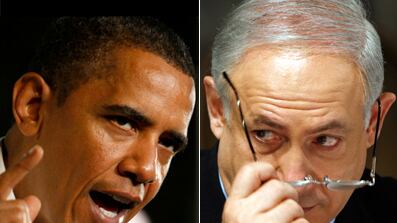
President Obama himself will meet with Israeli Prime Minister Binyamin Netanyahu next week. Peter Beinart on the fallout for Netanyahu in the Mideast.
Israel’s diplomatic war with the United States will likely end the same way its real war ended last year in Gaza: ambiguously. There will be no white flags or mission accomplished signs, just a slight tilt in the balance of power, a modest moving of the trench lines. Those lines aren’t fully demarcated yet, but in important ways the outcome is already clear: Barack Obama has won.
He’s won because he’s hurt Benjamin Netanyahu more than Netanyahu has hurt him. For decades, the relationship between an American president and an Israeli prime minister has resembled two guys with revolvers pointed at each other’s heads. For an Israeli prime minister, alienating your biggest patron is an excellent way to lose power—as Yitzhak Shamir learned after his showdown with George H.W. Bush and James Baker in the early 1990s. But for an American president, fighting with Israel almost always guarantees a fight with Congress, which tolerates little criticism of the Jewish state.
If round one went to Netanyahu, things are looking very different in round two.
Obama’s first confrontation with Netanyahu—when the White House demanded a halt to the growth of settlements in the West Bank early last year—didn’t go particularly well. Prodded by groups like AIPAC, many in Congress criticized Obama for bashing an ally. And even as Netanyahu’s U.S. allies peppered the White House with political buckshot, in Israel, Obama’s gun fired blanks. Perhaps overly impressed by the Shamir analogy, Obama administration officials confidently predicted that Netanyahu would suffer immense political pain for having scuffled with the White House. In fact, it wasn’t Netanyahu’s approval ratings that nose-dived; it was Obama’s. The White House was forced to swallow a merely partial and temporary halt to settlement growth, and polls appeared suggesting that Obama was wildly unpopular in the Jewish state.
But if round one went to Netanyahu, things are looking very different in round two. After Israel announced new building in east Jerusalem during Joe Biden’s visit there, thus imperiling proximity talks that the Obama administration had been laboring mightily to arrange, the White House reacted with fury. Alarmed, AIPAC soon urged members of Congress to begin lobbing grenades over the 1600 Pennsylvania Avenue fence. Republicans, and a few hard-line Jewish Democrats, complied. Interestingly, however, most Jewish congressmen refused to join in. To the contrary, Howard Berman, the influential chairman of the House Foreign Affairs Committee, declared that “the administration had real justification for being upset.” California’s Dianne Feinstein announced that “the chronic expansion of settlements is a serious obstacle.” Even the Conference of Presidents of Major American Jewish Organizations (we Jews have so many “major” organizations that the organizations themselves need an organization)—not a group known for its even-handedness when it comes to Israel and its neighbors—called on “all parties” to “act in a manner that does not undercut” peace talks.
• Martin Indyk: Solving the Israel Problem• Lloyd Grove: Jewish Anger at Obama If that wasn’t enough, Obama got political backup from an unlikely quarter: Centcom Commander and red-state heartthrob David Petraeus, who told the Senate Armed Services Committee that the “perception of U.S. favoritism for Israel” foments anti-Americanism and strengthens al Qaeda and Iran.
Meanwhile, in Israel, Netanyahu has been having a rougher time. Early polling is contradictory: Some surveys show him losing support while others show his approval numbers holding steady. But political elites have been treating him like a piñata. Shimon Peres, who as Israel’s ceremonial president usually remains above political spats, warned that “we cannot afford to unravel the delicate fabric of friendship with the United States.” Netanyahu’s defense minister, Ehud Barak, who also leads the Labor Party, noted that a peace process with the Palestinians is “one of the things that anchors us in the government”—implying that if Netanyahu keeps sabotaging peace talks, Labor could pull out. Nahum Barnea, one of Israel’s most revered journalists—and no knee-jerk lefty—urged Netanyahu not to attend this Monday’s AIPAC conference so as not to further alienate liberal American Jews.
There’s no point in exaggerating Obama’s victory. It’s unlikely that the East Jerusalem housing expansion that began this row will be formally reversed. Nor does Israel’s right-wing coalition government seem likely to fall any time soon. But Netanyahu will find it harder to torpedo upcoming talks with the Palestinians or to ensure that nothing of substance gets discussed. More importantly, Obama has shown that he can take on Netanyahu and inflict more political damage than he incurs. Both sides will remember that the next time.
Peter Beinart, senior political writer for The Daily Beast, is associate professor of journalism and political science at City University of New York and a senior fellow at the New America Foundation. His new book, The Icarus Syndrome: A History of American Hubris, will be published by HarperCollins in June. Follow him on Twitter and Facebook.






